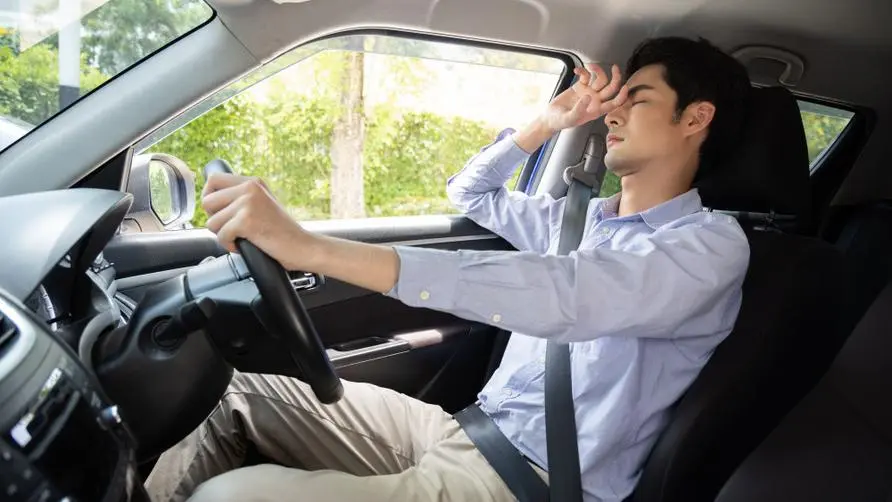Is fatigued driving as dangerous as drunk driving? Study: Staying up all night is most dangerous! The accident rate increased by 15 times

Is fatigued driving actually as harmful to other road users as drunk driving? A recent study published in “Nature and Science of Sleep” shows that missing just 1 hour of sleep the night before will increase the risk of a car accident; sleeping for only 4-5 hours will double the risk of a car accident, which is equivalent to a alcohol test. A driver with a value of 0.05 drives on the road.
Is fatigued driving as dangerous as drunk driving? Study: Staying up all night increases the risk of accidents by 15 times
A research team from Central Queensland University in Australia collected 61 studies on fatigue driving from 2000 to 2021 and conducted a rigorous review and analysis. The results showed that subjects who slept for more than 6-7 hours the night before driving had a lower risk of being fatigued while driving, but compared with those who slept for more than 8 hours, it was not enough to be called safe driving. The risk of car accidents may still increase by 30%.
The study further analyzed less sleep time and drowsy driving and found the following results:
Those who only slept for 4-5 hours the night before had a car accident risk approximately doubled, which is equivalent to a driver with a sobriety test value of 0.05 driving on the road.
Those who only slept 0-4 hours the night before increased the risk of a car accident by approximately 15 times.
Study author Madeline Sprajcer said the number of crashes caused by alcohol abuse has gradually declined over the past 20 years due to public education and more rigorous enforcement strategies such as roadside inspections. However, driver fatigue remains a serious problem. According to statistics from the Safety Network of the Ministry of Transportation and Communications in Taiwan, there were 296,826 accidents caused by fatigue driving in 2017; the number of accidents was as high as 635,036.
Sprajcer said there was more to consider than just scientific evidence when it came to drowsy driving. In fact, there are many people who may not be able to decide their own sleep time, such as parents who need to take care of newborns, shift workers, and even people with sleep disorders or mental illness. In addition, the amount of sleep and the individual’s subjective feeling of fatigue may be different, which makes fatigue driving more difficult to control.
Regarding the regulation of fatigue driving, Taiwan’s relatively similar control regulations are: “Those who are found to be driving continuously for more than 8 hours, or who are sick enough to affect their safe driving, will be fined not less than NT$1,200 and not more than NT$2,400, and they will be prohibited from driving. " Sprajcer suggested through the research results that if you sleep for less than 5 hours, you may not be able to drive on the road, but should get enough rest.
Drooping eyelids and missing intersections are dangerous signs! Avoid driving if “8 things” happen
Overall, drowsy driving does significantly increase the risk of a crash. According to the National Sleep Foundation, when an individual falls asleep or accidentally falls asleep while driving, the car can easily run off the road or collide with another vehicle. When these collisions occur on highways, they are more likely to cause injuries to numerous other road users.
The National Sleep Foundation says drowsy driving behavior can be dangerous even if a person is not actually asleep. Studies have shown that sleep deprivation can cause mental impairment similar to that of drunkenness, and 24 hours of sleep deprivation is roughly equivalent to a blood alcohol content (BAC) of 0.10%. The National Sleep Foundation reminds you that you should stop driving immediately and take a rest if the following conditions occur while driving:
Yawn frequently.
The feeling of dozing off begins to occur.
Tired eyes or droopy eyelids, increased blinking frequency.
Unable to remember how many kilometers I have driven or where I am.
Drift to other lanes and hit the curb or markings on the roadside.
Missing an intersection, road sign or turn.
Difficulty maintaining appropriate speed.
Too close to other vehicles.
The National Sleep Foundation recommends that people who often drive while fatigued should maintain a stable sleep time, limit the use of electronic devices before going to bed, and ensure that the bedroom environment is quiet and dark, conducive to uninterrupted rest. If you have persistent and severe difficulty falling asleep, or if you experience frequent daytime sleepiness, you should seek immediate medical attention and ask your doctor about the best ways to improve your sleep to test whether you are affected by an underlying sleep disorder.
source:
Drowsy Driving - Sleep Foundation
DRIVING ON LESS THAN 5 HOURS OF SLEEP IS JUST AS DANGEROUS AS DRUNK-DRIVING, STUDY FINDS
Further reading:





